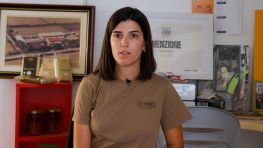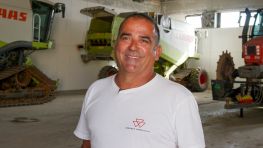 Rosalia Vacca and the Dream of…
Rosalia Vacca and the Dream of… Maurizio Tabacchi
The varietal selection and the Giant Rice of Vercelli.
Maurizio Tabacchi, the son of farmers from Brescia who moved to the Baraggia lands of Piedmont in the 1950s, was born in a rice farm and follows a training and professional path in the world of rice farming. Maurizio, after graduating in agriculture, wins a competition at the Risi National Authority and begins his journey that will last 12 years at the Castello d'Agogna Rice Research Center, dealing with agronomic problems of rice, genetics and quality.
In 2008 he returned to manage the family farm with a significant amount of luggage behind him. Maurizio's entry into the family business brings new stimuli: from the varietal selection, to the direct marketing of the processed rice, to the attempts to cultivate rice with organic techniques and to the recovery of ancient varieties which he deemed worthy of attention.
In his professional career Maurizio knows, through printed sources, a variety of rice that has a unique characteristic: being resistant to one of the worst diseases that can be encountered in the paddy field, the brusone. This specificity allows those who cultivate it to significantly reduce the use of fungicidal pesticides in the paddy field and therefore almost eliminate the environmental impact. The Giant is subjected to the Slow Food Vercelli Convivium and, in the space of a few years, is recognized as a Presidium to be protected and promoted.
Video table of contents
- Son of rice growers from Brescia moved to the Vercelli area.
- In the mid-1950s, many Lombards moved to cultivate the lands of Baraggia.
- The family farm and the idea of going back to being a farmer.
- The ancient varieties and the qualities of the Vercelli Giant Rice.
- The enhancement of the Giant and the risotto of the past, the creamy and kneaded risotto.
- The role of Slow Food and the ability to be open to the agro-industrial world of rice cultivation.
- The need to create an adequate cultural substrate to accommodate a different product: the success or failure of the recovery and enhancement project will depend on this element.
- The word "Vercelli" in the name of rice.
- Valuing local rice in a globalized world: parallels with wine.
- The least impact on the environmental facts for the cultivation of the Giant.
- The changes in rice cultivation in the last 30-40 years: underground sowing, use of water, dry.
- The explosion in the use of plant protection products. The changes from the nineties to today: a progressive reduction and the return of fauna.
- The improvement in recent years has not been communicated and valued.
- The right direction: limited use of products pending optimization in organic production.
- Climate change and water availability: changes in the sowing and harvesting calendar.
- Precision farming to reduce the use of chemicals.
- Organic farming, integrated farming and techniques to reduce environmental risk.
- The economic sustainability of zero-impact agriculture and the need to learn low-impact techniques: training, knowledge of tradition.
- The Giant's example should drive and involve other producers in low environmental impact actions: it's time to reverse the trend.
- The generational transition: difficulties and foresight.
- The textual sources through which I got to know the Giant and the historical value which, however, has never been successful among farmers.
- The resistance tests in South America and the United States: the Giant as the return of the "prodigal son".
Interview information
Country: IT
Region: Piemonte
City: Vercelli
Suburb: Cascina Vercellina
Maurizio Tabacchi
Date of birth: 08-06-1969
City: Vercelli
School: University
Profession: Farmer
Languages: Italiano
Document by: Luca Ghiardo
Video by: Luca Ghiardo
Created: 20-09-2018
Questo video fa parte del seguente archivio
Rice stories
Rice stories
Food is a fundamental resource for man and his health, both through the supply of nutrients and the ability to embody traits of human culture that play a leading role in our well-being.
Over time, each territory has built original ways in which to relate to the fruits of its land, enriching them with rituals, symbolic meanings and culinary customs. Much of these relationships have been lost following the years of the economic boom, with the exodus from the countryside to urban centers, with the advent of agriculture for mass production and ultimately with the globalization of markets and the consequent impoverishment of the heritage of biodiversity and ethnodiversity.
The purpose of this archive is to collect evidence relating to the main rice production area in Europe, that is the Po Valley, and to investigate, through the analysis of textual sources and testimonies collected in the field, both what survives of this heritage, and the ways in which which has evolved and reached us, paying particular attention to the explicit and implicit links that bind food and health.






